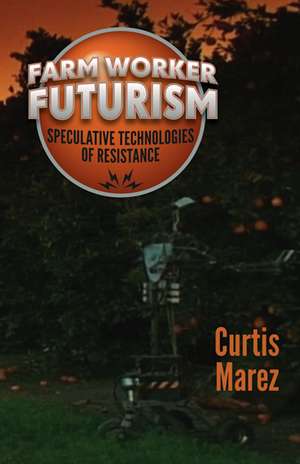Farm Worker Futurism: Speculative Technologies of Resistance: Difference Incorporated
Autor Curtis Marezen Limba Engleză Paperback – 17 iun 2016
When we think of literature and film about farm workers, The Grapes of Wrath may come to mind, but Farm Worker Futurism reveals that the historical role of technology, especially new media, has in fact had much more to do with depicting the lives of farm laborers—Mexican migrants in particular—in the United States. From the late 1940s, when Ernesto Galarza led a strike in the San Joaquin Valley, to the early 1990s, when the United Farm Workers (UFW) helped organize a fast in solidarity with janitors at Apple Computers in the Santa Clara Valley, this book explores the friction between agribusiness and farm workers through the lens of visual culture.
Marez looks at how the appropriation of photography, film, video, and other media technologies expressed a “farm worker futurism,” a set of farm worker social formations that faced off against corporate capitalism and government policies. In addition to drawing fascinating links between the worlds envisioned in UFW videos on the one hand and visions of Cold War geopolitics on the other, he demonstrates how union cameras and computer screens put the farm worker movement in dialogue with futurist thinking and speculative fictions of all sorts, including the films of George Lucas and the art of Ester Hernandez. Finally Marez examines the legacy of farm worker futurism in recent cinema and literature, contemporary struggles for immigrant rights, management–labor conflicts in computer hardware production, and the antiprison movement.
In contrast with cultural histories of technology that take a top-down perspective, Farm Worker Futurism tells the story from below, showing how working-class people of color have often been early adopters and imaginative users of new media. In doing so, it presents a completely novel analysis of speculative fiction’s engagements with the farm worker movement in ways that illuminate both.
Marez looks at how the appropriation of photography, film, video, and other media technologies expressed a “farm worker futurism,” a set of farm worker social formations that faced off against corporate capitalism and government policies. In addition to drawing fascinating links between the worlds envisioned in UFW videos on the one hand and visions of Cold War geopolitics on the other, he demonstrates how union cameras and computer screens put the farm worker movement in dialogue with futurist thinking and speculative fictions of all sorts, including the films of George Lucas and the art of Ester Hernandez. Finally Marez examines the legacy of farm worker futurism in recent cinema and literature, contemporary struggles for immigrant rights, management–labor conflicts in computer hardware production, and the antiprison movement.
In contrast with cultural histories of technology that take a top-down perspective, Farm Worker Futurism tells the story from below, showing how working-class people of color have often been early adopters and imaginative users of new media. In doing so, it presents a completely novel analysis of speculative fiction’s engagements with the farm worker movement in ways that illuminate both.
Preț: 126.61 lei
Preț vechi: 169.70 lei
-25% Nou
Puncte Express: 190
Preț estimativ în valută:
24.23€ • 25.20$ • 20.00£
24.23€ • 25.20$ • 20.00£
Carte indisponibilă temporar
Doresc să fiu notificat când acest titlu va fi disponibil:
Se trimite...
Preluare comenzi: 021 569.72.76
Specificații
ISBN-13: 9780816697458
ISBN-10: 0816697450
Pagini: 232
Ilustrații: 49
Dimensiuni: 140 x 216 x 18 mm
Greutate: 0.29 kg
Ediția:1
Editura: University of Minnesota Press
Colecția Univ Of Minnesota Press
Seria Difference Incorporated
ISBN-10: 0816697450
Pagini: 232
Ilustrații: 49
Dimensiuni: 140 x 216 x 18 mm
Greutate: 0.29 kg
Ediția:1
Editura: University of Minnesota Press
Colecția Univ Of Minnesota Press
Seria Difference Incorporated
Notă biografică
Curtis Marez is associate professor and chair of ethnic studies at the University of California, San Diego. He is the author of Drug Wars: The Political Economy of Narcotics (Minnesota, 2004), the former editor of the American Quarterly, and a past president of the American Studies Association.
Cuprins
Contents
Introduction: Farm Workers in the Machine
1. “To the Disinherited Belongs the Future”: Farm Worker Futurism in the 1940s
2. From Third Cinema to National Video: Visual Technologies and UFW World Building
3. Farm Worker Futurisms in Speculative Culture: George Lucas and Ester Hernandez
Afterword: Farm Worker Futurism Now
Acknowledgments
Notes
Index
Introduction: Farm Workers in the Machine
1. “To the Disinherited Belongs the Future”: Farm Worker Futurism in the 1940s
2. From Third Cinema to National Video: Visual Technologies and UFW World Building
3. Farm Worker Futurisms in Speculative Culture: George Lucas and Ester Hernandez
Afterword: Farm Worker Futurism Now
Acknowledgments
Notes
Index
Recenzii
"In Farm Worker Futurism, one comes face-to-face with the techno-fascism that was routed around daily by the collective actions of laborers who hacked the future with anticipatory illuminations and critical disturbances. This not science-fiction, but it is futurity-as-history that drives science-fiction into the present for activist, artists, and critics. Curtis Marez has written a unique and highly accessible book that calls on us to perform the speculative seeding of the future as farm workers to make new worlds grow now."—Ricardo Dominguez, University of California, San Diego
"Perhaps the greatest contribution of Farm Worker Futurism lies in its bold, creative, and apt attention to the intersections of labor and art as an inextricable dyad. Indeed, Marez’s attention to art associated with farmworker labor invites similar attention to art and discourse about a fuller range of labor-based cultural production."—American Literary History
"Farm Worker Futurism provides additional, much-needed fodder for what critical food scholars claim as the agrarian imaginary and its capacity to thwart policy aimed at increasing social and ecological justice."—H-Net
"Farm Worker Futurism provides additional, much-needed fodder for what critical food scholars claim as the agrarian imaginary and its capacity to thwart policy aimed at increasing social and ecological justice."—H-Net










